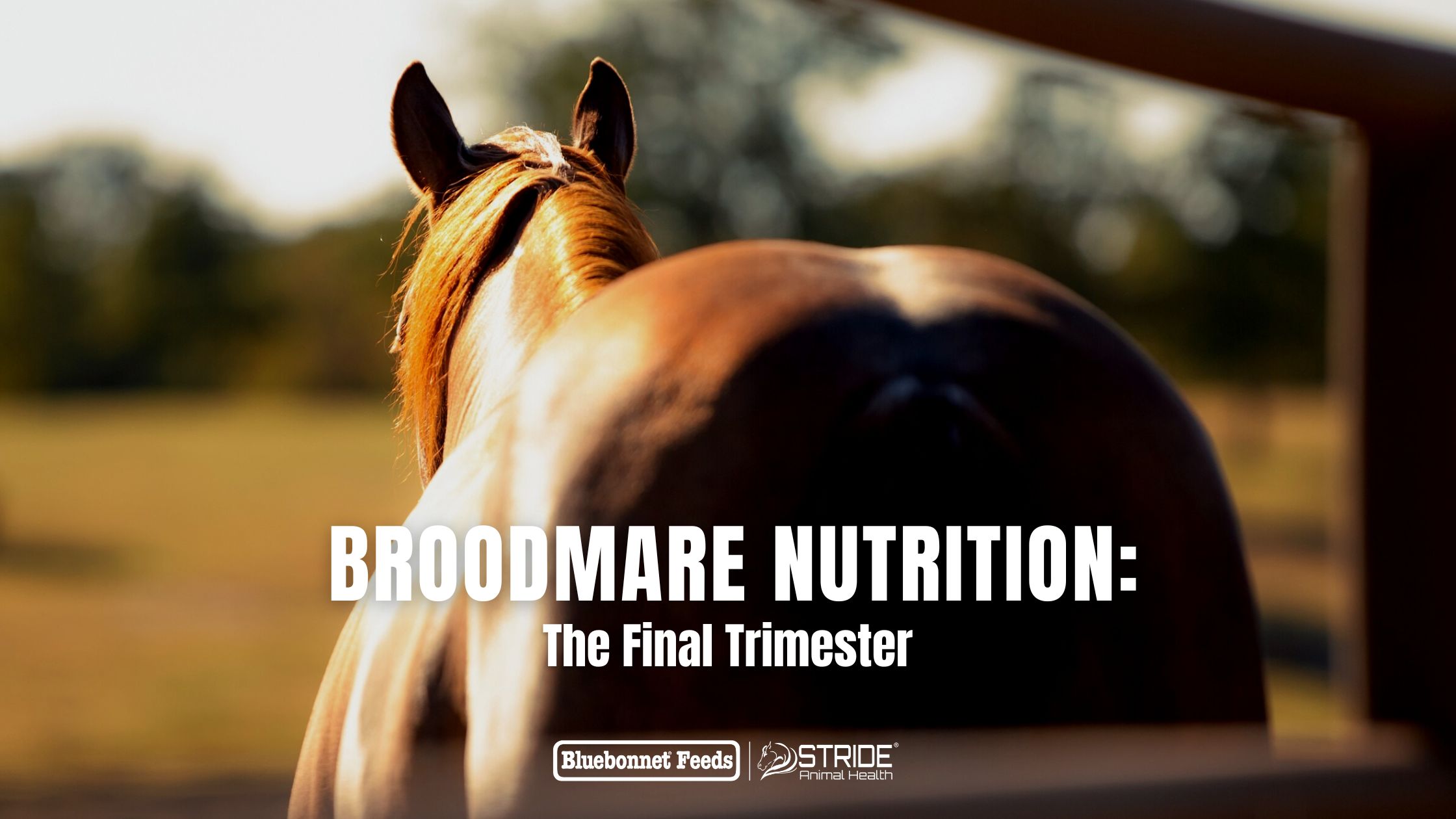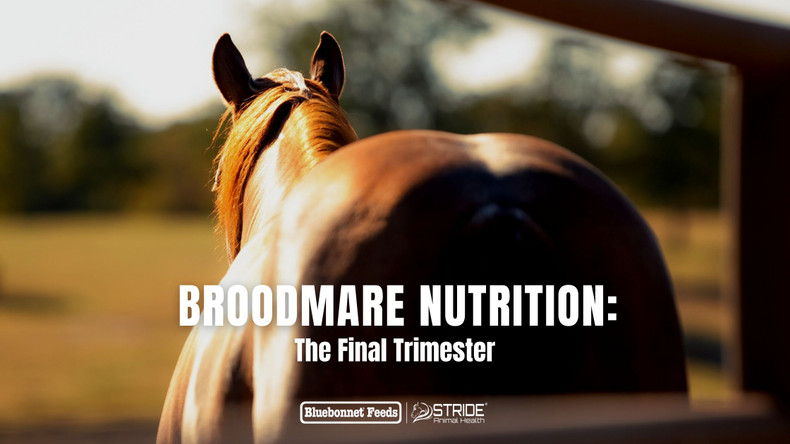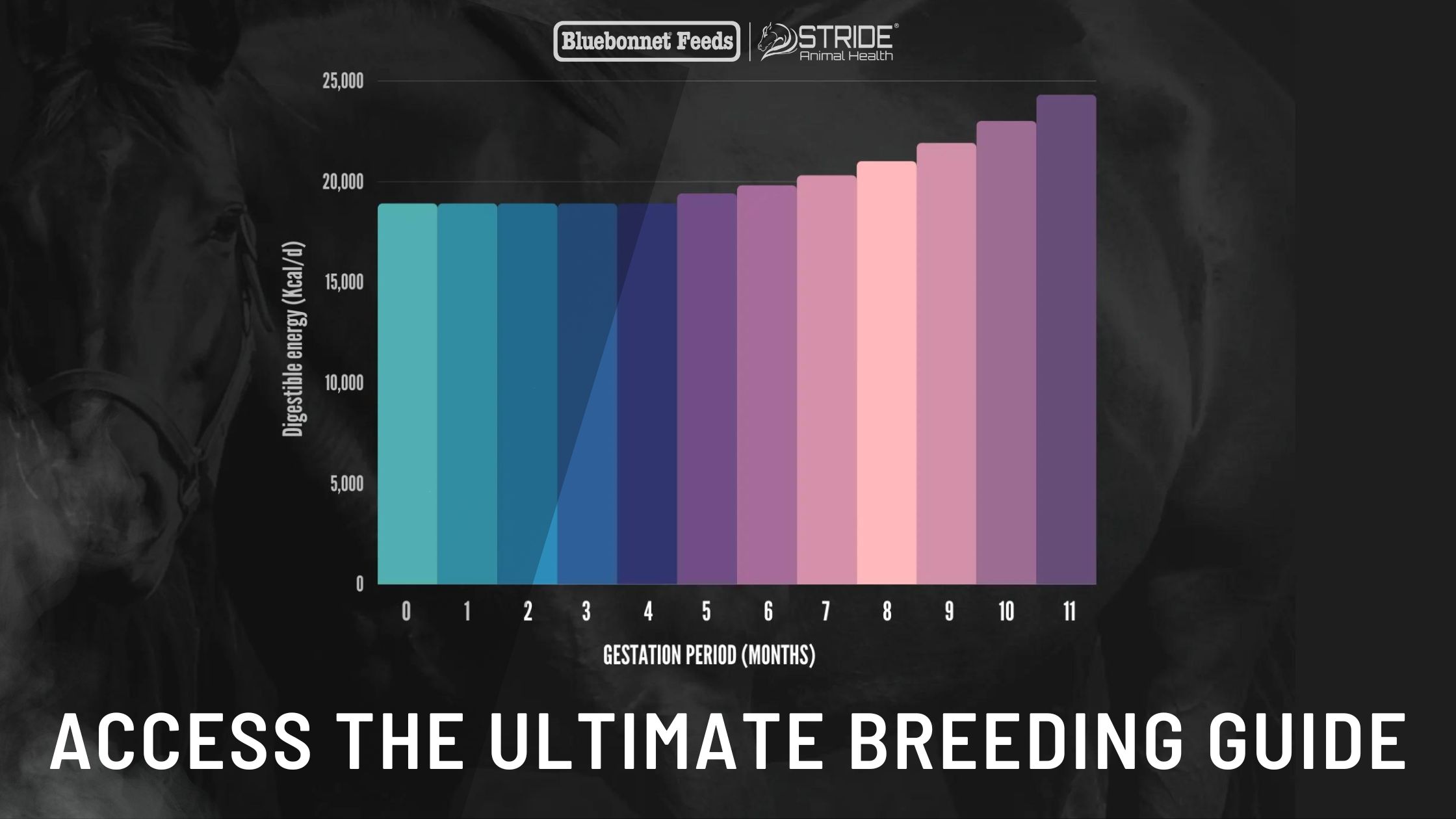
The third trimester of a mare’s pregnancy is one of the most critical times in a foal’s life, with the nutrition they get (or don’t get) during this time following them for the rest of their life. As foaling season approaches quickly, these nutritional tips can make sure mare and newborn are set up for success.
ENERGY REQUIREMENTS
The majority of growth occurs in the last three months of gestation, leading to a dramatic increase in energy needs. Most mares will need extra calories through a fortified feed and/or supplement¹ due to:
- Rapid growth, with the foal’s weight increasing an average of 1lb per day.
- The foal’s size takes up more room in the body, causing many mares to eat less hay or forage
- Milk production beginning during the last 4-6 weeks of pregnancy
Supply extra calories, as needed, by slowly increasing the amount of a fortified feed. Look for a feed specifically designed for broodmares and foals that:
- Is high in easily digestible fiber
- Provides enough energy to cover mare & foal needs
- Enough essential nutrients, in the guaranteed analysis, to cover mom and baby.
Bluebonnet Feeds’ Horseman’s Elite Mare & Foal Nugget and Intensify Growth & Development are great options to help fill nutritional gaps during gestation and after foaling.
HOW MUCH FEED IS TOO MUCH?
While thin mares are at a greater risk in early pregnancy, research has shown that overweight mares entering the 3rd trimester have more challenges during foaling. The recommended weight-gain of a healthy broodmare during gestation is 12% - 15% of their initial weight2. Ideally - a mare should maintain a body condition score between 5-6 throughout her pregnancy3.
Consequences of an overweight mare can be:
- A decrease in milk supply volume and colostrum quality. Colostrum is the “first milk” responsible for delivering the pathogen-fighting antibodies required to protect the foal after birth. Mares fed only 20% more than the recommended calories in a study4 had fewer antibodies in their colostrum.
- A reduced sensitivity to insulin, which can cause both mare and foal to experience an inability to maintain normal blood sugar levels.4,5 Dystocia, Equine Metabolic Syndrome, and laminitis are all risks of insulin imbalance.6,7,8
If your broodmare is overweight, work with your vet to carefully reduce concentrated calories. Be sure to provide adequate amino acids, vitamins, and minerals through a diet balancer like Stride 101 Diet Balancer to support optimal fetal development.
When adding a diet balancer:
Follow feeding recommendations to provide enough nutrients to cover both mare and foal. Usually, the dose is similar to that of a performance horse at work.
NOTE: ALWAYS MAKE CHANGES TO THE DIET SLOWLY OVER A FEW WEEKS, AND BE SURE TO CONSULT YOUR VETERINARIAN BEFOREHAND.
THE IMPORTANCE OF TRACE MINERALS
During the third and final trimester of a mare’s gestation, supplying proper amounts of trace minerals is critical. Minerals, like copper, are especially important for bone development1,9, which peaks during month 10, and then again immediately after birth. Any trace minerals that a foal needs before birth, and in the first few weeks of life, need to be provided during this time1 - as a mare’s milk contains very little. From 60-90 days of age, a foal will not be able to eat enough to meet requirements through feed or supplementation.
HOW OMEGA-3’S IMPACT THE THIRD TRIMESTER
The list of documented benefits from Omega-3 fatty acids is LONG. Research has shown positive effects with horses for:
|
- Joint Health10,11
- Memory & Learning 19,20 - Respiratory Function 12 - Exercise Recovery & Tolerance 21,22 - Skin & Coat Condition 13 |
- Allergies & Immune Function23
- Reproductive Health 14,15,16 - PSSM 72 & Insulin Sensitivity24 - Focus & Stress Management 17,18 - And more! |
With those kinds of benefits, many horse owners are eager to give their horses a boost with Omega-3’s, including their newborn foals. Newer research indicates benefits specific to young foals may even include: improved bone metabolism, memory, and cognition.19,25,26,27
RESEARCH SPOTLIGHT: IN MARES GIVEN MARINE-SOURCED OMEGA-3’S (DHA) DURING THE 30 DAYS BEFORE FOALING, A SIGNIFICANT INCREASE IN DHA LEVELS WERE OBSERVED IN THEIR FOALS25,26.
SECURE YOUR INVESTMENT THROUGH NUTRITION
The science of nutrition enables horse owners to place more control in their hands toward the outcome of their breeding, and the future of their foal’s life. Armed with knowledge; we strive to continue to improve practices, resulting in healthier mares and babies, and happier owners.
Stay tuned for the next post in this series:Broodmare Nutrition: Newborn Foals & Lactation
Cited Research:
1 - National Resource Council (NRC). Nutrient Requirements of Horses, 6th ed. Washington, D.C: National Academy Press, 2007
2 - B. Cassill, S. Jackson, L. Lawrence, Body weight changes in pregnant mares, J Equine Vet Sci, 29 (5) (2009), pp. 400-401
3 - I. Becvarova, R.S. Pleasant, C.D. Thatcher, Clinical assessment of nutritional status and feeding programs in horses, Vet Clin N Am-equine, 25 (1) (2009), pp. 1-21
4 - Coverdale JA, Hammer CJ, Walter KW. Horse Species Symposium: Nutritional programming and the impact on mare and foal performance. J Anim Sci 2015;93:3261-3267
5 - P.J. Johnson, C.E. Wiedmeyer, N.T. Messer, V.K. Ganjam Medical implications of obesity in horses–lessons for human obesity, J Diabetes Sci Technology, 3 (1) (2009), pp. 163-174
6 - Hannah L. Galantino-Homer, Julie B. Engiles, Insulin resistance and laminitis in broodmares, Journal of Equine Veterinary Science, Volume 33, Issue 10, 2013, Pages 844-846, ISSN 0737-0806, https://doi.org/10.1016/j.jevs.2013.08.011.
7 - R.J. Geor, Metabolic predispositions to laminitis in horses and ponies: obesity, insulin resistance and metabolic syndromes, J Equine Vet Sci, 28 (12) (2008), pp. 753-759
8 - S.R. Bailey, C.M. Marr, J. Elliott Current research and theories on the pathogenesis of acute laminitis in the horse, Vet J, 167 (2) (2004), pp. 129-142
9 - M Robles, C Gautier, L Mendoza, P Peugnet, C Dubois, M Dahirel, et al. Maternal nutrition during pregnancy affects testicular and bone development, glucose metabolism and response to overnutrition in weaned horses up to two years PLoS One, 12 (2017), Article e0169295, 10.1371/journal.pone.0169295
10 - Brennan, KM. et al. The effect of dietary microalgae on American Association of Equine Practitioners lameness scores and whole blood cytokine gene expression following a lipopolysaccharide challenge in mature horses. J Anim Sci. 2017.
11 - Hess, T. and Ross-Jones, T. Omega-3 fatty acid supplementation in horses. R Bras Zootec. 2014.
12 - Nogradi, N. et al. Omega-3 Fatty Acid Supplementation Provides an Additional Benefit to a Low-Dust Diet in the Management of Horses with Chronic Lower Airway Inflammatory Disease. J Vet Intern Med. 2015.
13 - Goh, YM. et al. Plasma n-3 and n-6 fatty acid profiles and their correlations to hair coat scores in horses kept under Malaysian conditions. J Vet Malaysia. 2004.
14 - Paper, C., & Branch, S. (2014). Does fish oil supplementation improve fresh and chilled sperm quality of Miniature Caspian Stallion? 1st international conference on new ideas in agriculture. Isfahan (Khorasgan) Branch, Islamic Azad Niversity. [Google Scholar]
15 - Kheradmand Garmsir, A., Zareh Shahneh, A., Ali Jalali, S. M., Nouri, H., & Afshar, M. (2014). Effects of dietary thyme (Thymus vulgaris) and fish oil on semen quality of Miniature Caspian Horse. Journal of Equine Veterinary Science, 34, 1069–1075. 10.1016/j.jevs.2014.06.008 [CrossRef]
16 - Robert D. Jacobs, Alan D. Ealy, Parker M. Pennington, Budhan Pukazhenthi, Lori K. Warren, Ashley L. Wagner, Aime K. Johnson, Tanja M. Hess, James W. Knight, Rebecca K. Splan, Dietary Supplementation of Algae-Derived Omega-3 Fatty Acids Influences Endometrial and Conceptus Transcript Profiles in Mares, Journal of Equine Veterinary Science, Volume 62, 2018, Pages 66-75, ISSN 0737-0806, https://doi.org/10.1016/j.jevs.2017.08.001.
17 - McKenzie, Erica C. et al. Effect of Dietary Starch, Fat, and Bicarbonate Content on Exercise Responses and Serum Creatine Kinase Activity in Equine Recurrent Exertional Rhabdomyolysis. J Vet Intern Med. 2003.
18 - King, SS. et al. The Effect of Omega-3 Fatty Acid Supplementation on Cortisol and Prolactin Concentrations in Response to Common Stressors in Horses. J Equine Vet Sci. 2009.
19 - Adkin, A.M., A.V. Muniz, C.J. Mortensen, et al. 2015. Maternal fatty acid supplementation influences memory and learning ability in yearling and 2-year-old horses. Journal of Equine Veterinary Science 35(5):419.
20 - Hansen, T.L., A.M. Adkin, and L.K. Warren. 2013. Effect of early exposure to maternal docosahexaenoic acid on memory and cognition in weaned foals. Journal of Equine Veterinary Science 33(5):364.
21 - Melo, S et al. Oil Supplementation Produces an Increase in Antioxidant Biomarkers in Four Beat Gaited Horses. Nutrition. 2014.
22 - Becvarova, V. Buechner-Maxwell, Feeding the foal for immediate and long-term health, Equine Vet J, 44 (2012), pp. 149-156
23 - O’Neill, Wendy et al. Flaxseed (Linum usitatissimum) supplementation associated with reduced skin test lesional area in horses with Culicoides hypersensitivity. Can J Vet Res. 2002.
24 - Hess, T. et al. Effects of n-3 Fatty Acid Supplementation on Insulin Sensitivity in Horses. J Equine Vet Sci. 2013.
25 - Snyder, J. N. Shost, R. Miller, K. Fikes, R. Smith, B. Corl, A. Wagner, I. Girard, and J. Suagee-Bedore 2021. Late gestation supplementation of long-chain fatty acids increases foal docosahexaenoic acid concentrations at birth. Journal of Equine Veterinary Science 100:103522.
26 - Kouba JM, Burns TA, Webel SK. Effect of dietary supplementation with long-chain n-3 fatty acids during late gestation and early lactation on mare and foal plasma fatty acid composition, milk fatty acid composition, and mare reproductive variables. Anim Reprod Sci. 2019 Apr;203:33-44. doi: 10.1016/j.anireprosci.2019.02.005. Epub 2019 Feb 13. PMID: 30803694.
27 - Buist, S.E., J.M. Kouba, J.D. Lillich, et al. 2015. Peripartum maternal DHA/EPA supplementation and the effect on mare reproductive parameters and foal bone metabolism. Journal of Equine Veterinary Science 35(5):441.


